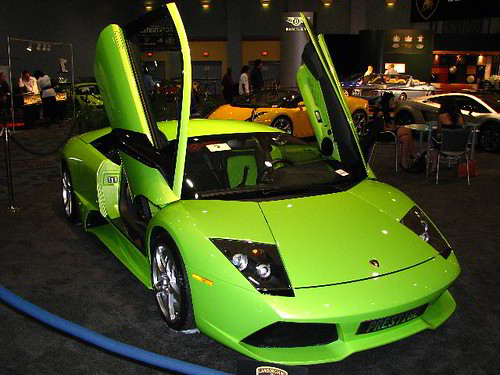|
|
|---|
Wednesday, October 7, 2009
Lithium and REE: Peak Oil: The End Of the Oil Age is Near, Deutsche Bank Says TNR.v, CZX.v, SQM, ROC, FMC, WLC.v, AVL.to, CLQ.v, RES.v, F, DAI, RNO,
Posted by andre at 4:17 PM
"We spent some time travelling: today we can say that Electric Mobility Revolution is happening, it is Lithium, it is safe and it is coming fast."
By Keith Johnson
Here’s an intriguing thought: Global oil supplies are indeed set to peak within a few years, and no, that is not bullish for oil. Quite the contrary—it will spell the end of the “oil age.”
That’s the take from Deutsche Bank’s new report, “The Peak Oil Market.” In a nutshell: The oil industry chronically under invests in finding new supplies, exemplified both by Big Oil’s recent love of share buybacks and under-investment by big oil-producing nations. That spells a looming supply crunch.
That will send oil to $175 a barrel by 2016—and will simultaneously put the final nail in oil’s coffin and send prices plummeting back to $70 by 2030. That’s because there’s an even more important “peak” moment on the horizon: A global peak in oil demand. That has already begun in the world’s biggest oil-consuming nation, Deutsche Bank notes:
US demand is the key. It is the last market-priced, oil inefficient, major oil consumer. We believe Obama’s environmental agenda, the bankruptcy of the US auto industry, the war in Iraq, and global oil supply challenges have dovetailed to spell the end of the oil era.
The big driver? The coming-of-age of electric and hybrid vehicles, which promise massive fuel-economy gains for short-hop commuting but which so far have not been economic.
Deutsche Bank expects the electric car to become a truly “disruptive technology” which takes off around the world, sending demand for gasoline into an “inexorable and accelerating decline.”
In 2020, the bank expects electric and hybrid vehicles to account for 25% of new car sales—in both the U.S. and China. “We expect [electric propulsion] will reverse the dynamics of world oil demand, and spell the end of the oil age,” the bank writes.
But won’t cheaper oil in the future just lead to a revival in oil demand? That’s what’s happened in every other cycle. Au contraire, says the bank: Just as the explosion of digital cameras made the cost of film irrelevant, the growth of electric cars will make the price of oil (and gasoline) all but irrelevant for transportation.
In a report filled with interesting tidbits, one in particular stands out: The cost of the Iraq war at the pump. Deutsche Bank figures the cost of the war at $1.5 trillion. Amortized over 20 years, that works out to $75 billion a year. “If the US government taxed US gasoline consumers purely to reflect the financial cost of the war in Iraq, gasoline prices should be some 54 cents per gallon higher,” the report notes."
Here’s an intriguing thought: Global oil supplies are indeed set to peak within a few years, and no, that is not bullish for oil. Quite the contrary—it will spell the end of the “oil age.”
That’s the take from Deutsche Bank’s new report, “The Peak Oil Market.” In a nutshell: The oil industry chronically under invests in finding new supplies, exemplified both by Big Oil’s recent love of share buybacks and under-investment by big oil-producing nations. That spells a looming supply crunch.
That will send oil to $175 a barrel by 2016—and will simultaneously put the final nail in oil’s coffin and send prices plummeting back to $70 by 2030. That’s because there’s an even more important “peak” moment on the horizon: A global peak in oil demand. That has already begun in the world’s biggest oil-consuming nation, Deutsche Bank notes:
US demand is the key. It is the last market-priced, oil inefficient, major oil consumer. We believe Obama’s environmental agenda, the bankruptcy of the US auto industry, the war in Iraq, and global oil supply challenges have dovetailed to spell the end of the oil era.
The big driver? The coming-of-age of electric and hybrid vehicles, which promise massive fuel-economy gains for short-hop commuting but which so far have not been economic.
Deutsche Bank expects the electric car to become a truly “disruptive technology” which takes off around the world, sending demand for gasoline into an “inexorable and accelerating decline.”
In 2020, the bank expects electric and hybrid vehicles to account for 25% of new car sales—in both the U.S. and China. “We expect [electric propulsion] will reverse the dynamics of world oil demand, and spell the end of the oil age,” the bank writes.
But won’t cheaper oil in the future just lead to a revival in oil demand? That’s what’s happened in every other cycle. Au contraire, says the bank: Just as the explosion of digital cameras made the cost of film irrelevant, the growth of electric cars will make the price of oil (and gasoline) all but irrelevant for transportation.
In a report filled with interesting tidbits, one in particular stands out: The cost of the Iraq war at the pump. Deutsche Bank figures the cost of the war at $1.5 trillion. Amortized over 20 years, that works out to $75 billion a year. “If the US government taxed US gasoline consumers purely to reflect the financial cost of the war in Iraq, gasoline prices should be some 54 cents per gallon higher,” the report notes."
Subscribe to:
Post Comments (Atom)















0 comments:
Post a Comment